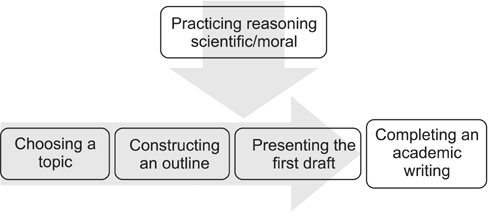Ewha Med J.
2017 Jan;40(1):41-49. 10.12771/emj.2017.40.1.41.
The Effects of Peer Assessment and Peer Feedback in Writing Education for Premedical Students
- Affiliations
-
- 1Department of Medical Education, Ewha Womans University School of Medicine, Seoul, Korea. clairejungakim@gmail.com
- KMID: 2367896
- DOI: http://doi.org/10.12771/emj.2017.40.1.41
Abstract
OBJECTIVES
There are several problems which hamper the successful teaching of writing in medical education. To deal with these problems, teachers should be conscious of two general questions; what to teach in writing class for premedical students; and how to utilize the writing class time. This paper examines the value of peer assessment and peer feedback in dealing with those questions.
METHODS
This paper reviews a subject in premedical education, Logical Thinking and Writing, from the perspective of peer assessment and peer feedback.
RESULTS
Students accomplished the learning objectives and they recognized the value of peer assessment and feedback.
CONCLUSION
Peer assessment and peer feedback foster students' participation in class and accelerate the learning process. This strategy reminds students of the fact that they are writing an essay for an audience.
Keyword
MeSH Terms
Figure
Reference
-
1. Papp KK, Huang GC, Lauzon Clabo LM, Delva D, Fischer M, Konopasek L, et al. Milestones of critical thinking: a developmental model for medicine and nursing. Acad Med. 2014; 89:715–720.2. Mamede S, Schmidt HG, Penaforte JC. Effects of reflective practice on the accuracy of medical diagnoses. Med Educ. 2008; 42:468–475.3. Stern DT, Papadakis M. The developing physician: becoming a professional. N Engl J Med. 2006; 355:1794–1799.4. An JH, Kwon I, Lee SN, Han JJ, Jeong JE. Study on the medical humanities and social sciences curriculum in Korean medical school: current teaching status and learning subjects. Korean J Med Educ. 2008; 20:133–144.5. Yi JN. Identity and direction of thinking and expression. Ratio et Oratio. 2008; 1:55–90.6. Kim CW. [Four types of teaching methods for academic writing and another type]. In : The 9th Conference of Ratio et Oratio; 2009 Dec 19; Seoul. p. 19–26.7. Asghar A. Reciprocal peer coaching and its use as a formative assessment strategy for first-year students. Assess Eval High Educ. 2010; 35:403–417.8. Topping KJ. Trends in peer learning. Educ Psychol. 2005; 25:631–645.9. van den Berg I, Admiraal W, Pilot A. Peer assessment in university teaching: evaluating seven course designs. Assess Eval High Educ. 2006; 31:19–36.10. Finn GM, Garner J. Twelve tips for implementing a successful peer assessment. Med Teach. 2011; 33:443–446.11. Glynn LG, MacFarlane A, Kelly M, Cantillon P, Murphy AW. Helping each other to learn: a process evaluation of peer assisted learning. BMC Med Educ. 2006; 6:18.12. Won MH, Park JH, Park ST, Kim SH, Han KH, Yi CH, et al. Critical thinking academic wrting. Seoul: Sungkyunkwan University Press;2014.13. Giere RN, Bickle J, Mauldin R. Understanding scientific reasoning. 5th ed. Belmont, CA: Wadsworth;2005.14. Zinsser WK. On writing well: the classic guide to writing nonfiction. 30th Anv Rep ed. New York: Harper Collins Publisher;2006.
- Full Text Links
- Actions
-
Cited
- CITED
-
- Close
- Share
- Similar articles
-
- Learning through multiple lenses: analysis of self, peer, near-peer, and faculty assessments of a clinical history-taking task in Australia
- Nursing Students' Peer Feedback Types and Emotional Response, Quality of Feedback, and Self-efficacy for Learning from Peer Feedback in Skill Training
- The Recognition and Need of Medical Student on Peer Review in Cadaver Dissection
- Educational Implication of Peer Evaluation in Problem-based Learning
- Peer-assisted feedback: a successful approach for providing feedback on United States Medical Licensing Exam-style clinical skills exam notes in the United States


